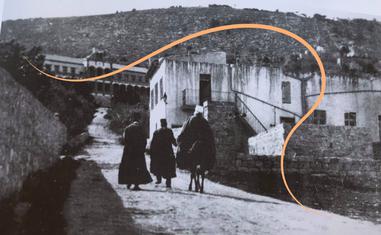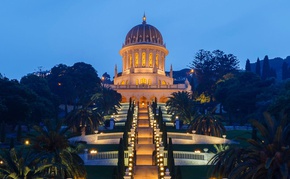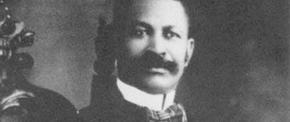The views expressed in our content reflect individual perspectives and do not represent the authoritative views of the Baha'i Faith.
In 1912, when Rabbi J. Leonard Levy invited Abdu’l-Baha to give a public address at Pittsburgh’s premier Hotel Schenley, he wrote a new page in the history of American interfaith cooperation.
Located in the Oakland section of Pittsburgh, near Squirrel Hill (where my family and I now live) the beaux-arts Hotel Schenley now serves as the Student Union for the University of Pittsburgh. American presidents, royalty from many different countries, and the rich and famous stayed there in the hotel’s heyday, but it is now best remembered by many as the site of Abdu’l-Baha’s first full exposition of the Baha’i principles on U.S. soil.
RELATED: The Centenary of Abdu’l-Baha’s Ascension: A Fragrant Trail
In his address at the Schenley, Abdu’l-Baha – the son and successor of Baha’u’llah, who founded the Baha’i Faith in the 19th century – summarized the core Baha’i principles of the unity of religion and of humanity. As he spoke, Abdu’l-Baha also briefly told the story of Baha’u’llah’s exile and imprisonment for proclaiming his new Faith, explaining how his father’s teachings brought about:
… severe trials, great difficulties and violent persecution. He was imprisoned, tortures were inflicted upon Him, and finally He was banished from His native land. He bore every ordeal and infliction cheerfully. In His successive exiles from country to country up to the time of His ascension from this world, He was enabled to promulgate His teachings, even from prison. Wherever His oppressors sent Him, He hoisted the standard of the oneness of the world of humanity and promulgated the principles of the unity of mankind.
Since Baha’u’llah’s family was also imprisoned with him, Abdu’l-Baha had direct firsthand experience of the tests and difficulties he endured. The Baha’i magazine published at the time, called Star of the West, recounted a telling story about Abdu’l-Baha’s reaction to the luxurious hotel rooms at the Schenley:
The dear friends in this city engaged an apartment on the seventh floor of the Schenley Hotel and were exceedingly happy about it, because it looked like that of the Plaza Hotel in Chicago. Then during their private interviews, the friends, one by one asked the same question: “… how do you like these rooms?” His reply to all was also the same, “Khaylí khúb! Khaylí khúb!” — meaning “Very good! Very good!”
When all had left his presence happy and pleased, he turned his smiling face toward this servant and exclaimed, “The friends here are anxious to know if I like these rooms! They do not know what we had to go through in the past. Imagine the conditions and surroundings when we were exiled by the Turkish Government and were imprisoned in the barracks of ’Akka; Baha’u’llah occupied one room; his family and several other families were forced to occupy one room. Aside from the severe illness that was raging, and the death of many among us prisoners – adults and children – on account of unsanitary surroundings and starvation, I noticed that my own presence in that crowded room was another source of torture to all of them. This was due to the fact that parents and children were suppressing and restraining themselves by trying to be quiet and polite in my presence. So, in order to give them freedom, I accepted the morgue of the barracks, because that was the only room available, and I lived in it for about two years. Now the kind friends here wish to know if I like these magnificent rooms!”
According to a classic Baha’i history, known as Mahmud’s Diary, those traveling with Abdu’l-Baha reported:
We left Cleveland at 8:00 a.m., arriving in Pittsburgh around noon. The friends in Pittsburgh, who had been informed by telegram of Abdu’l-Baha’s arrival, were waiting at the station. When the train pulled in, they were overjoyed to see him and followed him to the Hotel Schenley where he was staying.
After an hour’s brief rest, Abdu’l-Baha received many people who had been invited by the [Baha’is] to meet him. Some were leaders of the Jewish community who invited him to address their congregations. However, owing to a previous commitment at the Peace Congress in New York City, he was not able to accept their invitation.
One of the “leaders of the Jewish community who invited him to address their congregations” was Rabbi J. Leonard Levy of the Rodef Shalom Congregation in the city.
RELATED: Learning from Abdu’l-Baha’s Commitment to Service
Recently, Matthew Falcone, Rodef Shalom Congregation’s new president, discovered “a large steamer trunk” in the “subterranean floor of the synagogue.” The trunk “sat below the congregation’s ark and bimah” and contained “the sermons of Rabbi J. Leonard Levy, who served the congregation from 1901 until his untimely death in 1917. Each package was cataloged, marked by volume and series.” The contents were entrusted to Martha Berg, Rodef Shalom archivist, for processing. According to Martha Berg, Rabbi Levy was one of the most prominent rabbis in America and was known internationally as well, as David Rullo reported in the Pittsburgh Jewish Chronicle:
“Rabbi Levy was really significant in Reform Judaism in the early 20th century,” she said. “He was probably one of the four or five best known rabbis at that time in the U.S., and had an international reputation.” “Now,” Berg continued, “no one knows very much about him. I think that anything we can do to resuscitate his reputation and tell new stories about him is really valuable.”
Throughout his speaking tour across America and in Canada, Abdu’l-Baha’s talks, for the most part, were organized by the Baha’is themselves. In Pittsburgh, however, not only did the invitation come from someone other than a Baha’i, but the organization of the event itself appears to been arranged by a multi-faith — and therefore interfaith — task force, as reported in The Pittsburg Press:
ABDUL BAHA TO SPEAK AT HOTEL SCHENLEY
_______
Noted Leader of Society to Deliver Address on Peace.
Abdul Baha, a native of Teheran, Persia, and leader of 15.000,000 Bahais, arrived in Pittsburg from Cleveland this afternoon and will speak at 8:15 o’clock this evening in the ballroom of the Hotel Schenley.
Representatives from evangelical churches, the Vedanta society, New Thought association and the Theosophical society met yesterday at McCreery’s to arrange for the meeting tonight.
The party coming from Cleveland today will include Abdul Baha, Dr. and Mrs. Edward Getsinger, of Washington, D. C., Mrs. Ralston, of California, Miss Grace Roberts (sic: “Robarts”), from Boston, Dr. Fareed and Mirza Sayd Assadullah (sic: “Mirza Sayyid Asadu’llah”), of Syria, and Mizra Mahmoud, of Teheren, Persia (sic: “Mirza Mahmud, of Tehran, Persia”).
Other evidence suggests that the Pittsburgh journalist and Baha’i Martha Root may have been instrumental in organizing the Hotel Schenley event. In his 2012 book, Abdu’l-Baha in America, Baha’i historian Robert H. Stockman notes that the Hotel Schenley speech marks “the first time Abdu’l-Baha had enunciated a series of Baha’i principles to a public audience in North America”:
After breakfast with a few Cleveland Baha’is, at 8am the next morning, he was on a train to Pittsburgh, where Martha Root (1872–1939), a devoted Baha’i, had arranged for him to talk at the Hotel Schenley that night. Four hundred attended. He repeated his comments about the greatness of America’s material civilization, its need for spiritual civilization, and the unity Baha’u’llah had brought to diverse people in Iran, and he enumerated seven teachings of the Baha’i Faith: the importance of investigation of reality; the oneness of humanity; the oneness of religion and science; the adjustment of the economic standards of humanity; the abandonment of all prejudices; the equality of men and women; and education of all members of society. He added that “no matter how far the material world advances, it cannot establish “the happiness of the human world…when the material civilization shall be linked with the spiritual or divine civilization, then happiness will be assured.” Jesus Christ had summoned all to such a civilization through the “acquisition of good morals.” The principles Abdu’l-Baha had enunciated were, in effect, the “good morals” needed in the modern day.
It was a significant talk because it was the first time Abdu’l-Baha had enunciated a series of Baha’i principles to a public audience in North America. He did not just list principles, however; he set them in the context of the inadequacy of material civilization and the need for spiritual civilization. It was a point that, later, Baha’is did not always understand or emphasize when they explained the Faith’s teachings.
After the talk, Abdu’l-Baha met privately with leaders of thought. Five local newspaper articles were a product of his visit.– Robert H. Stockman, ‘Abdu’l-Bahá in America (Wilmette, IL: Bahá’í Publishing, 2012), pp. 152–153.
Abdu’l-Baha’s visit to Pittsburgh and his powerful speech there had a profound effect on the city and its citizens, and inaugurated a lively and productive interfaith dialogue that continues to this day.
It seems fitting to close with Rabbi Levy’s “last word” from his final sermon, on April 22, 1917, delivered four days before his death:
I tell you today, were it my last word I would utter to you, I would say with the consciousness that I was passing out of your lives, I would say to you, also to the Jews of America, wake up and realize that before you is the greatest opportunity in all history to become the espousers of the international movement that shall take place [among] the nations of the earth under the sway of the one and only God, on the basis of international brotherhood. – J. Leonard Levy, “My Last Word,” in J. Leonard Levy, Prophetic Voice, edited by Solomon B. Freehof and Vigdor W. Kavaler (Pittsburgh: Rodef Shalom Congregation, 1970), p. 149.

















Comments
Sign in or create an account
Continue with Facebookor